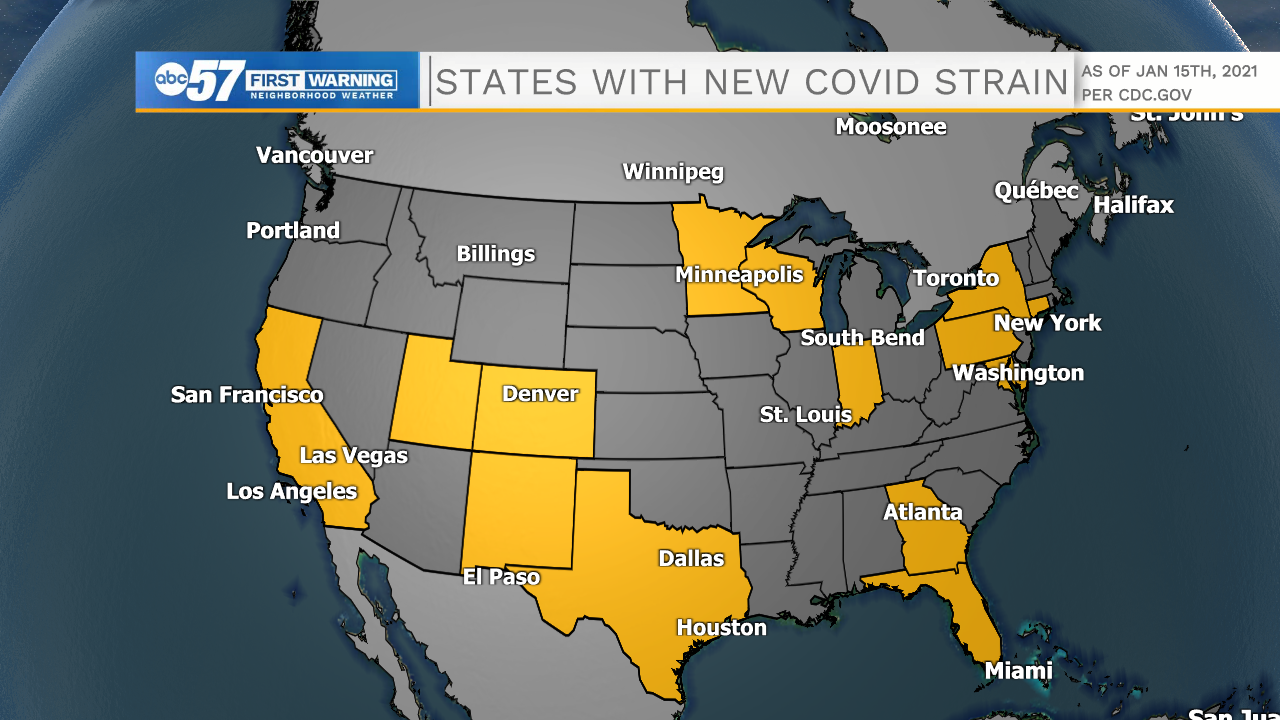I'm sure you've seen headlines and heard the news - a new, more contagious coronavirus stain has made it's way to Indiana.
But what is it that makes this strain more contagious? Is it more dangerous? How do viruses even mutate in the first place?
To help me answer those questions, I talked with Alex Perkins, an Associate Professor of Biological Science at Notre Dame.
Professor Perkins says the main signatures scientist has looked at to determine that this strain of the coronavirus is more contagious is the pattern in which it has spread. Particularly with the variant in the United Kingdom.
He said, “What they have seen in the last couple of months is a very clear increase in the virus that they are sequencing that turns out to be this strain. So it does appear that it has some better competitive advantages over other viruses, so therefore it is more transmissible.”
Professor Perkins explained that there is still much to learn about this new strain and what makes it spread so quickly.
Professor Perkins continued, “That’s something that we don’t know for sure. Some of the likely possibilities is that is a little bit better at infecting cells so it infect more cells within your tissue, in particularly in the nasal area which leads to a larger amount of virus that people are expelling. We don’t know for sure but it’s probably something along those lines.”
According to the CDC, at least one person has tested positive for this new variant in Indiana but none so far in Michigan. However, that doesn't necessarily mean people people don't have it. (*Update 1/19/21: a case of the new variant has now been confirmed in Michigan)
Due to the lack of analysis on the millions of tests preform every week, it's hard to know how many people truly have the new variant.
The through of the potentially scary new virus mutations is something we might be used to seeing dramatized in a Hollywood movie.
But experts tell me, just how a variant of COVID-19 came about in the first place is actually pretty common.
Professor Perkins says, “So viruses mutate all of the time. It’s a completely normal way of how they operate. They get into our bodies, they infect cells and then they replicate there. As they replicate, that involves them copying their genetic materials and then making new copies. So they are doing that all of the time. Just by its very nature, that involves some accidents that occur which leads to changes in the sequence of the virus.”
He continues, “Just imagine if you took something that was printed out on a sheet of paper and you just had to write copies of that over and over and over again, millions of times, you’d be bound to make mistakes. So that’s very analogous to the virus and what’s happening when it’s replicating.”
This new UK variant of COVID-19 isn't the first mutation of this virus either.
Gillian Conrad with the Berrien County Health Department says, “Already throughout the COVID-19 pandemic, there have been thousands of variants that have been noted by scientists all over the world. Just because a virus might mutate and a new variant might present itself on the world stage, doesn’t mean that that new variant is more contagious, more deadly or cause more serious illness."
She continues explaining that the science community wasn't caught off guard by this either.
“This is on our radar, it’s not like this is popping up and it's not earth shattering news to anyone in the public health community that a virus mutated and is showing up in a new different variant. This is something we know is happening, we anticipated it and we are keeping our eye on it."
Professor Perkins says that the protections from the virus still work.
He says, “As far as we understand right now, both natural and vaccine derived immunity should be protected against this new strain. Or at least at least as much so as they would’ve been against previous strains so by in large I think that protections should still exist.”
To continue to help stop the spread, health professionals continue to urge - keep social distancing, keep washing your hands and wearing your mask.
In summary, I'm told there is no reason to be alarmed by this new strain. Virus mutations happen all the time and while the UK strain seems to be more contagious, the same preventative measures are expected to work against it too.
Thankfully, it currently looks like this mutation will NOT make you any sicker than the strain we are all familiar with.
We are learning more about COVID-19 all the time. To keep up with the latest information, you can click here.















